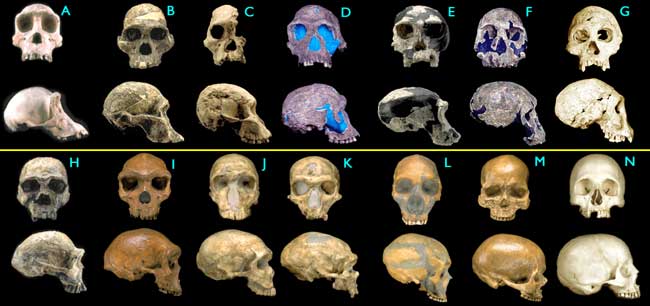I read that link, but im still left clueless, of how retro virus have anything to do with us having a common ancestor ?
Lay mens terms please.
Here's the short version. A retrovirus in our DNA is an indication of a failed infection that occurred in one of our ancestors. These are rare occurrences, because for them to be passed on, the failed infection has to be in a cell that leads to a sperm or egg that is later fertilized. They are also highly randomized, because retroviruses insert themselves more or less at random into any one of at least thousands of different sites when they try to reproduce.
So, when we see two organisms with the same retrovirus in the same location in the DNA, then we can infer that the two organisms share a common ancestor that passed on this failed infection.
When we look at pieces of the DNA in various primates, including humans, chimpanzees, gorillas, orangutans, and various monkeys, we see a particular pattern emerge. For simplicity, I will only consider here ERV's that are found in human DNA. When we look only at those ERV's found in us, the following pattern emerges:
1. Some ERV's are unique to humans. That is, we see a chunk of DNA like so in humans:
GCAAC
TACCGCTGCT
(where the letters GCAT represent a chunk of DNA, with the x's representing a retrovirus)
and like so in all other primates:
GCAACGCT
(note that this is just an example illustration: in reality the sequences will be much, much longer, and a few of the base pairs will be different, about 1/50, when we look at chimpanzees, more when we look at other species)
It's the same piece of DNA, but without the retrovirus sequence. We infer, therefore, that these retroviruses occurred in a common ancestor that humans share.
Then, we look at more ERV's. We find some ERV's that are in our DNA, in chimpanzee DNA (same location, same basic sequence), but are absent in all other primates. These ERV's had to occur in an ancestor that humans and chimpanzees share.
Others we find in humans, chimpanzees, and gorillas, but absent in all other primates. These ERV's had to occur in an ancestor that humans, chimpanzees, and gorillas share.
Others we find in humans, chimpanzees, gorillas, and orangutans, but absent in all other primates. These ERV's had to occur in an ancestor that all apes share.
Others we find in humans, chimpanzees, gorillas, and old world monkeys, but absent in new world monkeys. These ERV's had to occur in an ancestor that apes and old world monkeys share.
And so on and so forth. Presumably you get the point.
I think its absurd that man went from apes to man. I can use observational science for this. If the case were true, then i would think we would see half ape half human species continually evolving into humans.
You're wrong. Evolution doesn't repeat itself. Observing this sort of thing would actually disprove evolution.
First of all, consider the time scales involved: our recent ancestor with chimpanzees existed approximately 4-6 million years ago. It took 4-6 million years, then, to evolve from a sort of chimpanzee-like ancestor to us. Why should we expect to see anything like that happen again in less than 1/10,000th the time, a few hundred years? Obviously we shouldn't.
Then there's the problem that the world is different now. The same selective pressures that affected our ancestors just don't exist any longer. So we shouldn't expect to see apes evolving into even human-like organisms.
There should be tons of fossils of half ape half human transitional fossils out there to be found.
Oh, there are.
Tons of them. But for a short illustration, take a gander at this picture:
The skull on the top left is a chimpanzee skull. The skull on the bottom right is the skull of a modern human. The skulls in between are listed from oldest to youngest. Can you tell where the "ape" skulls end and the human skulls begin?
From:
http://www.talkorigins.org/faqs/comdesc/section1.html#morphological_intermediates_ex3
Amazes me also that we just stop at human form in the process of evolution. I guess evolution is done right ? I dont see man evolving into some other species. Even if you can make an argument that has something to do with our organs, or our cells, fact is were still homo sapien sapiens.
What makes you think we've stopped evolving? The evidence appears to be that because of our massive population growth, human evolution is
accelerating. What you seem to fail to understand, though, is that evolution takes many generations, typically, for changes to be noticeable. Why on Earth should you expect to visibly
see changes in the couple of generations you are alive? That's like heading out to watch an oak tree for a day, and subsequently conclude it isn't growing because you don't see any change in a day.
By the way, for an interesting novelty in human evolution, take a look at the ostrich tribe in Africa:
http://www.ourstrangeworld.net/?p=7985
They have feet that are missing the three middle toes. They are still human, of course, but they are humans with somewhat different physical characteristics. If this tribe remains separated from the rest of the human race for long enough, more changes will appear (both in us and in them). How long until we become two different species of humans? It might be as few as fifty to a hundred generations.


